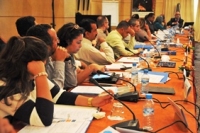 9 September 2014 – Currently, two biggest public health emergencies – the Middle East respiratory syndrome coronavirus (MERS-CoV) in the WHO Eastern Mediterranean Region and Ebola virus disease in the WHO African Region are posing the biggest threats to global health security.
9 September 2014 – Currently, two biggest public health emergencies – the Middle East respiratory syndrome coronavirus (MERS-CoV) in the WHO Eastern Mediterranean Region and Ebola virus disease in the WHO African Region are posing the biggest threats to global health security.
The outbreak caused by MERS-CoV since its emergence in 2012 has killed over 300 people and affected half of the countries (11 out of 22) in the Region and the current outbreak of Ebloa is by far the largest and the first multi-country outbreak of the disease ever reported. The current epidemic trend remains precarious, with infection transmissions continuing to occur in urban communities and in health facilities across these countries. The outbreak has killed over 1500 people so far.
Transmission risks
A number of countries in the Region have international travel hubs that connect these countries with those of western Africa where the outbreak is currently ongoing. Although risk of transmission of Ebola through international travel is presumed to be low, in all likelihood, Ebola could be introduced to the Region through a passenger travelling to the Region from any of the affected countries in west Africa with widespread and intense transmission.
In view of these two ongoing biggest threats to global health, the WHO Regional Office for Eastern Mediterranean organized a workshop in Casablanca, Morocco from 3 to 5 September 2014. The workshop focused on plans to enhance surveillance for severe acute respiratory infections for early detection, recognition and response to MERS-CoV, as well as public health measures that could effectively early detect any imported case of Ebola virus disease, as well as limit local transmission once a case associated with international travel is imported.
“The emergence of these two infectious disease threats – continue to test public health capacity and resilience and are sending a sharp reminder that a threat anywhere is a threat everywhere in this globalized world,” Dr Jaouad Mahjour, Director for Communicable Diseases, highlighted in his remarks during the opening session of the workshop.
Recommendations
At the end of 3-day workshop, recommendations were made encompassing measures to enhance surveillance of severe acute respiratory infections, and further actions were agreed upon to improve detection and response for MERS-CoV, as well as surveillance of MERS-CoV among returning pilgrims.
Moreover, countries are requested to improve public health preparedness for early detection of any imported case of Ebola.
In particular, countries are requested to:
- provide leadership and coordination for planning, periodic risk assessment, and enhanced vigilance;
- strengthen screening at points of entry as required under the International Health Regulations (IHR 2005);
- establish effective surveillance system for contact tracing and monitoring; reinforce infection control precautions in health care settings;
- improve access to quality diagnostics testing and rapid turnaround of results;
- improve social mobilization, and risk communication for Ebola.
In addition, WHO was requested to work closely with countries to help improve public health preparedness for Ebola, and provide support to countries in the areas of risk communication, infection control, laboratory diagnostics and surveillance.
Related links
International Health Regulations 2005 | Arabic
World travel advice on MERS-CoV for pilgrimages
Latest updates on the Ebola outbreak


